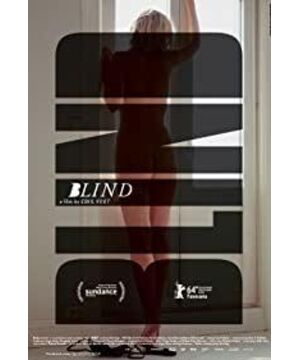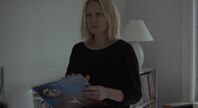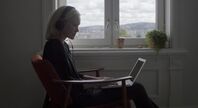Re-examining each character, if you hope to construct the plot through the characters, in "Blindsight", it will be a disappointment. Regarding the exquisite editing and construction of time, space and plot, "Blindsight" has been praised. Breaking the continuity of the real narrative and seamlessly connecting the fiction, we see another possibility for the film to "train" the audience. It is not the story itself that is complicated, but the storyteller.
In a world of blind people, what does she care about "seeing" or "thinking"? Taking "blindness" as the object of the film - telling the story of the blind girl Ingrid, and taking "blindness" as the main body - the blind girl Ingrid tells the imaginary story. This choice deliberately increases the difficulty of the film's narrative, making the plot more complex, confusing and confusing.
In "Visual Pleasure and Narrative Cinema," Laura Mulvey addresses "scopophilia," which refers to of sexual pleasure. Individuals have a sexual instinct to look at others, and this conscious looking can elicit specific desires and gratifications. The male gaze (Male Gaze) brings visual pleasure (Visual Pleasure), and the female role assumes the object of gaze.
But in this film, the female as the protagonist, although the visual screen still shows the responsibility of "nudity", but because of the addition of imagination, the heroine Ingrid has the ability to "gaze" through the creation of stories. This ability determines What the male characters in the play see and what they cannot see. But can this active choice avoid the projection and erosion of male desire? Is a blind world better or worse, a defect or a trauma, an incompetent surprise, or a game between imagination and reality?
The film begins by illustrating the technique of imagination. Ingrid, the blind heroine, reiterates that memory can be blurred and faded, and it takes imagination to train and create. In her stories, Einar, the man with braids, is a solitary man who is addicted to sexuality. He uses pornographic videos to vent his desires and distance himself from women in the real world. If blindness is the physical reason that isolates Ingrid from the real world, then the braided man as his opposite identity - male, the opposite physiological setting - strong and healthy, and appearing in the story is her most intuitive psychological projection, Needs and desires for their own lack.
The windows in the building are the beginning of the connection between the virtual and the illusion of the play. The eyes are often referred to as the windows to the soul, and the windows are the best daily gateway to the act of voyeurism. These are closely linked to the theme of "blindness". Through the windows, the owner's life trajectory is unobstructed. The braided man also starts peeking through the window at Elin, the "heroine" by Ingrid. The film continues to develop with the story imagined by Ingrid. The dialogue between Elin and her daughter is worth pondering. She doesn't want her daughter to notice her loneliness, so she fabricates a lie about the visit of an old friend. Panicked. This also just verifies what the film said at the beginning, "the more imagination about the details, the more real the imagination can be." Imagination cannot be groundless, it must be recreated based on our memory and reality, every time from the heroine's When the story returns to reality, we will learn that her occupation, the variety shows she watches, the music she is listening to, and even the red wine in her hand have all become elements in the imaginary story.
Calvino wrote in "Invisible Cities": "Desire has become memory." When there is a gap between reality and memory, desire is most helplessly blocked. Ingrid's description of the braided man was that "the internet couldn't give him the feeling of touching those carcasses, or being touched". This also expresses Ingrid's anxiety, which actually comes from her memory. Due to changes in reality (new apartment, new environment), the memory becomes untrustworthy and unreliable, and every time it needs to be confirmed by a third party before moving on. So the imagination became a sanctuary, where she could break through the boundaries and make changes at will. On the other hand, when husband Morten introduces her to his architectural model, when she refuses to attend his celebration party, we can see that imagination brings her a new fear - the unknown.
This kind of video logic wandering between subject and object, the diversity of discourse, and the structure of narrative make the cultural definition based on gender difference indefinable, which is undoubtedly an ambitious attempt.
The film won the 2014 Sundance Film Festival's Screenwriting Award for Drama in the World Cinema category, and Eskil Vogt was already well-received when he co-wrote "Oslo, 31. august" with Joachim. focus on. Nordic-style cold talker, depressive loneliness aesthetics, and Eskil Vogt is well-versed in depicting the psychological struggles of postmodern characters.
But how to make art films not "dull" is actually a bigger challenge than shooting commercial films. As a multi-dimensional platform covering film viewing, selection, star effect, commercial distribution, and even political voice, the film festival is a special channel for reconciling independent art production and the film and television industry. The three major European film festivals have always been fond of art films, but they have always been criticized for their highness and lack of performance. The Sundance Film Festival in the United States has received increasing attention in recent years. It not only comes from the selection model of flat artists, and the establishment of audience awards. On the other hand, it has always been known as a springboard for art directors to switch runways and direct mainstream commercial films. . Although the atmosphere of "Blindsight" is cold and melancholy, the suspenseful plot splicing makes people follow it closely, and the positive ending at the end also eases the overall depression. As Ingrid said at the end of the play, everything will be fine. The world is sometimes a reflection of light in darkness.
This article was published in Hong Kong Film Critics Society
View more about Blind reviews










